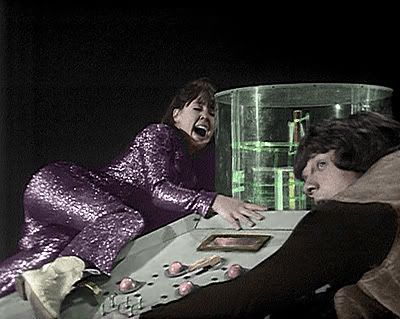 The Doctor Who episode The Mind Robber
The Doctor Who episode The Mind Robber ventures into strikingly postmodern ground, as the Doctor and his companions Zoe and Jamie find themselves in the land of fiction.
The Doctor uses an emergency feature on the TARDIS to take it outside of time and space. They find themselves in a strange realm which turns out to be the “land of fiction” which includes a forest of words and characters from mythology and literature, as well as authors and legendary historical figures. The entire experience blurs the lines between reality and fiction, in particular as the Doctor tries to save Jamie and Zoe from being turned into fictional characters, as well as meeting the same fate himself.
The episode also featured the TARDIS seemingly being blown up and completely destroyed – first the first but not the last time in the show’s history.
 The person whose mind is supposedly being harnessed by a computer mind to create these fictional realities – and who wants the Doctor to replace him – is known as “the Master” but cannot be identified with the time lord who goes by that name. The only way to avoid it being a continuity error that “The Master” evokes no reaction related to that figure whom the Doctor supposedly knew as a child is to suggest that the Doctor only became aware of his use of the name “The Master” after this. The person in question in “The Mind Robber” is a human being kidnapped from earth, author of “The Adventures of Captain Jack Harkaway,” stories which appear in a magazine called The Ensign. Whether the name of this character contributed to the later Captain Jack Harkness, I do not know. But once again, the layers of fiction within fiction, and fictional characters treated as real ones trying to avoid becoming fictional, leaves a lot of room for discussing what stories do, and whether the boundary between reality and fiction is as clear as we have sometimes imagined.
The person whose mind is supposedly being harnessed by a computer mind to create these fictional realities – and who wants the Doctor to replace him – is known as “the Master” but cannot be identified with the time lord who goes by that name. The only way to avoid it being a continuity error that “The Master” evokes no reaction related to that figure whom the Doctor supposedly knew as a child is to suggest that the Doctor only became aware of his use of the name “The Master” after this. The person in question in “The Mind Robber” is a human being kidnapped from earth, author of “The Adventures of Captain Jack Harkaway,” stories which appear in a magazine called The Ensign. Whether the name of this character contributed to the later Captain Jack Harkness, I do not know. But once again, the layers of fiction within fiction, and fictional characters treated as real ones trying to avoid becoming fictional, leaves a lot of room for discussing what stories do, and whether the boundary between reality and fiction is as clear as we have sometimes imagined.
The mind that supposedly controls “The Master” of the land of fiction is described as “a higher power, greater than you can imagine.”
There are other interesting potential continuity errors – the Doctor describes the minotaur as merely a mythical creature, but he has since met the Nimon, not to mention even more recently the even more minotaur-like being in “The God Complex.”
 But of course, all of this is rather moot in a story that playful explores the possibilities and limits of stories, and of stories within stories. It features a battle of swordsmen which is itself an expression of a battle of authors to tell the best story and triumph. But all the while the Doctor risks turning himself and his friends into fiction, since if he writes something for himself and them, that is just what will happen. The distinction between history and fiction is described in terms of whether the writing or the events come first.
But of course, all of this is rather moot in a story that playful explores the possibilities and limits of stories, and of stories within stories. It features a battle of swordsmen which is itself an expression of a battle of authors to tell the best story and triumph. But all the while the Doctor risks turning himself and his friends into fiction, since if he writes something for himself and them, that is just what will happen. The distinction between history and fiction is described in terms of whether the writing or the events come first.
I should also add that I loved suddenly hearing an excerpt from Bruckner’s Symphony No.7 as the background to a bit of swashbuckling.
There is a lot of humor in the episode, including a moment when Jamie is turned into a faceless life-sized cut out of himself, and the Doctor has to restore him by putting his face back together like a puzzle. The Doctor botches the attempt, and so for a brief period Jamie is played by a different actor!












